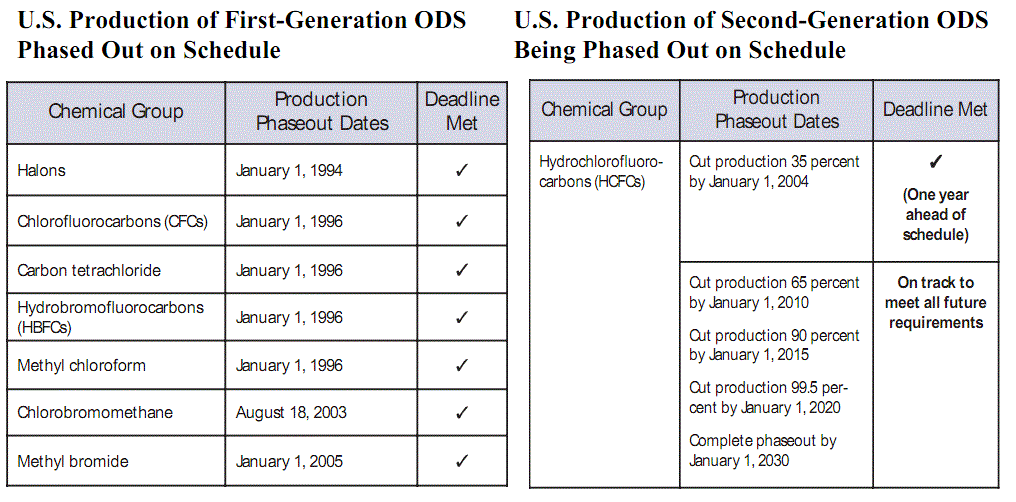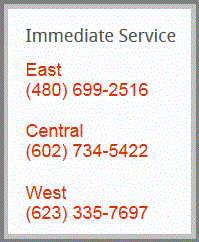Montreal Protocol – How The Restriction of R22 Refrigerant Affects Your Phoenix AC Service Needs
As an environmentally conscious Phoenix AC installation center, American Cooling and Heating keeps close tabs on programs designed to provide critical ozone layer protection. This makes compliance with the Montreal Protocol on Substances that Deplete the Ozone Layer a significant component of the AC&H Glendale, Gilbert and other Phoenix area air conditioning services.
A Hole in the Ozone
Ultraviolet (UV) radiation from the sun can harm the earth and the life thereon. However, the dangers are limited by a high-altitude air-shield created as a natural protective resource for life and the abundance thereof on this tiny planet. Technically identified as the stratospheric ozone layer, this air-shield is susceptible to damage due to manufactured human waste products.
Identified by some scientists, including Nobel prize-winning scientist Paul Crutzen, as a hole in the atmosphere that “marks the worst disaster to hit global environment,” the depletion of the ozone layer is a direct result of man-made chemicals. The initial problem became evident during the mid-1970s. Something was changing, and as scientists began to study the events they noticed that the thickness of the Earth’s ozone layer was decreasing. Additional studies followed. Soon after, plans for correcting the problem began to take shape.
A Multi-Nation Solution to AC Refrigerant and Other ODS Complications
In September of 1985, major changes concerning global efforts to control depletion of the earth’s ozone layer began to take place. Naming a September 16 meeting of the United Nations as the International Day for the Protection of the Ozone Layer, a host of nations came together for the purpose of establishing precise goals for the healing of the hole in the sky.
In September of 1987, the international community came together and signed into effect a joint ozone protection agreement defined as the Montreal Protocol. This established the foundation for precise measures established to ensure the protection of the Earth’s stratospheric ozone layer. As of 2013, 191 countries have participated in meeting the stipulations of the Protocol. By signing the agreement, these nations have committed to the process of phasing out the production and consumption of ozone depleting chemicals.
Hailed among the most successful international treaties ever crafted, the Montreal Protocol extends beyond the original meeting goals by prompting multiple nations to come together as one cooperative entity capable of resolving major environmental issues. In recognition of the significance of this achievement, countries around the world typically assemble to celebrate the signing of the Montreal Protocol.
U.S. Responses to the Terms of the Montreal Protocol
The current U.S. EPA response to the Montreal Protocol reflects a sustained and renewed commitment toward U.S. implementation of the Montreal Protocol on Substances That Deplete the Ozone Layer. The history of associated U.S. regulations begins with the 1990 Clean Air Act (CAA) – modified ‘98 to provide additional provisions and deadlines concerning protection of the Earth’s stratospheric ozone layer.
CAA Amendments define the EPA’s involvement in the development and enforcement of national regulations dedicated to managing ozone-depleting substances (ODS) within U.S. borders. The legal framework of the process is fully defined in Title VI of the CAA instruction codes. As of 2013, the U.S. has met, exceeded and even accelerated the deadline dates as projected under the provisions of the Protocol as well as the CCA instructions.
In summary, the U.S. regulatory program establishes the following goals:
- Flexible Allowance System – The initial program for the reduction of ODS production and import.
- Regulated Reclamation and Recycling – A program that ensures emission control of AC refrigerants and other ODS products.
- Alternative Refrigerant Solutions – The Significant New Alternatives Policy (SNAP) establishes a means for introducing and gaining approval of alternatives to ODS products. Current better than 300 alternative solutions have been approved for consumer and commercial use. The EPA has also approved over 60 industrial alternative products.
- Forced Management – EPA preventive regulations now ban the release of ozone-depleting refrigerants. During service, maintenance or replacement of AC products, professional air conditioning service centers must collect and properly dispose of all ODS refrigerant fluids. The controls include the management of any form of refrigeration equipment.
- Product Labeling – New regulations ensure that manufacturers correctly label and product that contains harmful ODS materials.
- Exemptions – When immediate full-scale alternative ODS products are not yet available the EPA grants temporary product exemptions. The primary list of exempt items includes: CFCs used in medical inhalers, essential fumigant methyl bromide projects and managed ODS inventories awaiting destruction.
The following chart reveals the current and projected status of the U.S. ODS phase-out program:
Phoenix AC Installation and the Effects of the Montreal Protocol
The R22 phase out is already in effect. The year 2020 will bring about cease in the production of R22 refrigerant. In 2010, a ban against the production of new air conditioning equipment requiring R22 refrigerant became law. U.S. homeowners and business owners, including those in Glendale, Scottsdale and other Phoenix areas, will not be forced to upgrade their existing equipment. The refrigerant will remain available for another seven years. However, the cost will continue to rise due to an increase in demand and a decrease in supply.
As a professional Phoenix AC installation and service professional, the team at American Cooling and Heating can help you measure the value of retaining your existing air conditioning systems for yet a few more seasons against the value of investing in a new, environmentally friendly and energy efficient ac unit.
Call to schedule an appointment:
Montreal Protocol, ODS products, ozone depletion, Phoenix, R22 refrigerant

